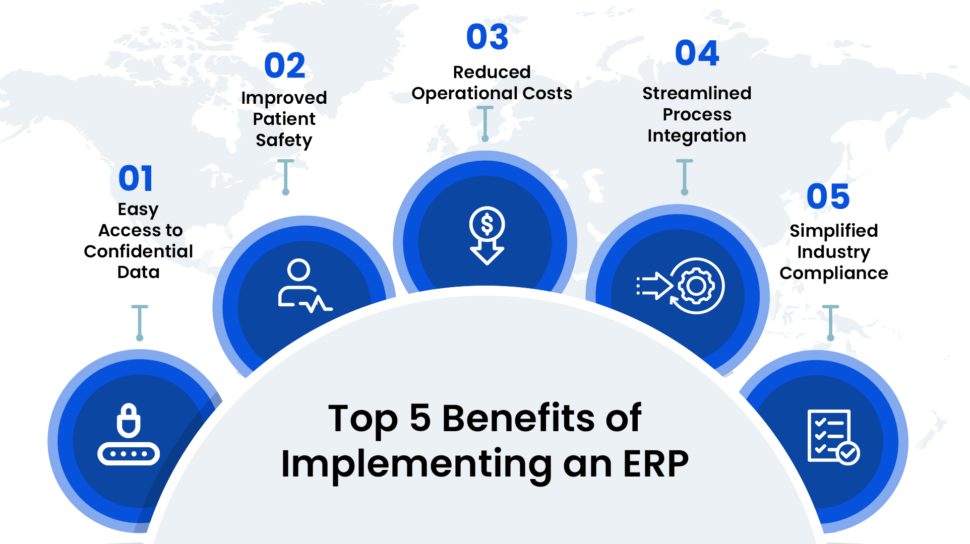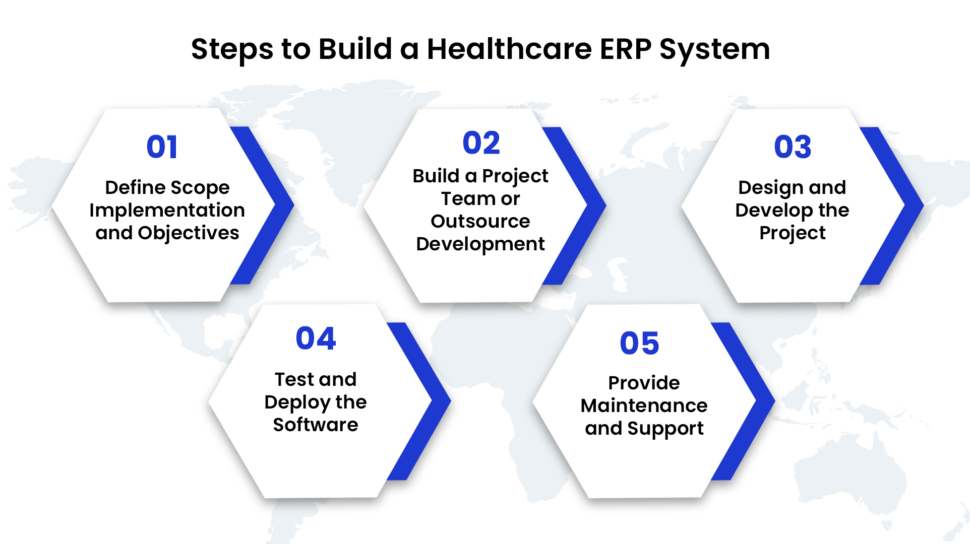The healthcare sector is currently showing an exponential growth pattern. The global digital health market size, valued at $195.1 billion in 2021, is expected to surpass $780.05 billion by 2030, at a CAGR of 16.1% during the forecast period (2022- 2030).
As the industry grows, industry leaders realize the benefits of an ERP in healthcare, thus moving away from disparate legacy platforms to a unified, comprehensive platform with delegated access to all. What has triggered this shift is cloud computing, which brings a paradigm move to cloud-based ERP from on-premise deployment owing to cost-effectiveness, security, and agility in administration.
As a result of this, cloud-based healthcare ERP solutions are expected to increase, and the healthcare ERP market size in the US is expected to reach $2.1 billion by 2025, growing at a CAGR of 5.6% from 20219 to 2025, according to a report by Grand View Research.
Healthcare organizations seek the best platform to provide the best possible care for their patients. Accurate data and reliable information are what they look for, making an investment in the right ERP in healthcare to manage and store data becoming critical with the ever-growing amount of information.
What is ERP in Healthcare, and How Does it Help?
Enterprise resource planning (ERP) can act as your healthcare organization’s focal point and give you the power to manage and integrate essential information from other departments into a centralized database. It helps consolidate and organize confidential data and ensure proper, efficient processes are intact across the network by improving strategic and financing planning, reducing costs, modernizing operations and procedures, and enabling better patient care.
The following are some primary areas in which an ERP in healthcare can help.
- Improved Productivity
- Account and Cost Savings
- Business Intelligence
- Data Security
- Informed Decision-Making
- Automated Payments
- Patient Engagement
- Automated Supply Chain Operations
- Improved Inventory Operations
Now if you are still trying to decide if it can be the right move for your organization, read on as we will explain in detail how ERP can help transform the healthcare industry. Let us begin with understanding the benefits of implementing an ERP.
Top 5 Benefits of Implementing an ERP in Healthcare
The benefits of an ERP in healthcare are immense. They range from optimizing processes to helping different departments collaborate better and improve the relationship between all stakeholders. The following are several of the most valued benefits of an ERP.

Easy Access to Confidential Data
When patients try to make an appointment or express medical concern, the healthcare provider can pull out their records immediately using the ERP. Furthermore, you can quickly transfer all paper-based and manual records into the ERP and access data through a single click, thus improving user experience.
Therefore, adopting telehealth technologies help when adopted by healthcare providers and automates prioritizing patients who need immediate medical care. In addition, emergencies can be adequately handled with telehealth technologies and their easy access to confidential data.
Improved Patient Safety
The news of breaches occurring is common, with reports like where 32 million US patient records were hacked coming in every day. Medical records are highly confidential and involve personal information related to the patient, meaning very high stakes are involved. The risk of a data breach increases when sensitive data is transferred between multiple systems.
Therefore when data is decentralized and managed manually, strict measures are required to prevent cyber threats, which is where ERP helps with a robust, scalable system that is simple to use, significantly reducing the risk of compromising patient privacy. In addition, ERP systems facilitate better communication between patients and medical staff. When you move your patient records to an ERP system, advanced user controls can ensure that only authorized personnel get access in just a few clicks.
Reduced Operational Costs
Implementing the ERP can reduce expenses in many ways, as it automates various operational processes. For example, an ERP can be programmed to monitor finances, inventory levels, etc., thus reducing administrative errors and optimizing payroll, accounts, and inventory management operations.
Also, medical institutions with multiple departments must perform intercompany transactions, consolidations, and mergers, which take time and money. An ERP can help in these cases with a lower rate of errors, so your medical institution can focus on other essential tasks at hand.
Streamlined Process Integration
When switching to an ERP system, your healthcare organization can see an increase in productivity and a decrease in overhead as data is easily accessible; a centralized database can integrate many operational requirements and departments such as supplies, finance, inventory, etc.
Many healthcare facilities may need help with medical material management owing to rushed deliveries, expired stock, etc. An advanced ERP simplifies this process with automatic replenishment by taking advantage of stock, notifying expired materials, and collecting the best pricing and insights from vendors.
Simplified Industry Compliance
Regulatory compliance is a must for healthcare, and to respond well to compliance requirements, companies must ensure operations are transparent, secure, and traceable. Having outdated recordkeeping measures means failing the audit process or being found incompliant with industry-specific regulations. An ERP can provide the necessary information by adhering to industry regulations anywhere.
Types of ERP in the Healthcare Industry
ERP has evolved and is classified into three types per the implementation type and its benefits.
On-Premise ERP
On-premise ERP is available on the healthcare provider’s computer with the presence of an IT team in-house who takes care of installation and maintenance. It can work offline, too, without needing an active internet connection to access the data.
The healthcare provider owns the servers and has an IT team to update, care for and maintain upkeep. Typically, large healthcare organizations with extensive data opt for this implementation as they completely control every aspect and module.
Cloud-based ERP System
Healthcare organizations can also opt for ERPs offered by third-party vendors on a per-month or annual basis. It grants access to data with an active internet connection. There is no need for IT specialists, as the vendor manages and maintains the ERP on your behalf. This type is best suited for healthcare organizations that are just starting since these solutions are much cheaper than on-premise systems.
Hybrid ERP System
This type is a combination of both on-premise and cloud-based ERP. Businesses can opt for this model to integrate cloud modules into existing on-premise as they scale. Therefore, the data is present on both the cloud and on-premise. This can be a good option for healthcare organizations that wish to combine and incorporate both on-premise and cloud.
Components of an ERP Healthcare Solution
An ERP in healthcare consists of several interconnected modules that manage several tasks, operations, and projects. Every task on the ERP is collaborative with employees across departments who can add, modify, and manage any number of requests on time.
The following are some components that can be added to the healthcare organization with specific needs and wish to automate manual operations.
- Electronic Health Record (EHR): An ERP can be integrated with the EHR easily, thus boosting operational efficiency. It helps the organization better manage the supply chain and better analyze the needs of all stakeholders involved.
- Human Resources: This component can easily handle employee tasks such as enrollment, daily trackers, and automated payments, thus reducing human error and time spent on monotonous daily tasks.
- Business Intelligence: It can help in the analysis and report delivery, solve issues about hospital data collection, etc.
- Inventory Management: It can keep track of the hospital’s inventory and automate the system for practitioners to know if medicines and materials are in stock.
- Patient Relationship Management: This module stores and stacks patient-generated data. It can easily store, access and manage relevant patient information such as health records and payments.
- Financial Management: The component helps analyze and keep track of the company’s financial data, budget, costs, payments, etc.
Guide: Healthcare App Development
Steps to Build a Healthcare ERP System
Every ERP system is unique and needs a planned approach, as a lot of time and resources are invested in building healthcare ERP solutions. The following are the steps to build an ERP.

Define Scope Implementation and Objectives
Start the ERP implementation in healthcare by outlining the project scope and the objectives you wish to accomplish with the healthcare ERP. Knowing the complete details of the project goal for better results is always good.
For example, you can enhance patient experience with a customer care chatbot that can answer queries on your behalf, send push notifications to remind appointments, better streamline reporting, etc. Study the current healthcare ERP solutions in the market and then apply the features and components discussed above to implement top healthcare ERP systems.
First, begin with the requirement analysis, proceed with the desired features, and then prepare a specifications document to develop the desired ERP.
Build a Project Team or Outsource Development
The most important stage is deciding who will undertake the custom ERP development project. You will need the following people on board for developing the project.
- Project Manager: They plan the project lifecycle, assign and manage project-related tasks, and provide delivery timelines.
- Business Analyst: They do the requirement analysis and research to help you build a product that meets all stakeholder requirements.
- UI/UX Designers: They design and create an intuitive user interface that can be implemented effectively.
- Healthcare Tech Experts: Frontend and Backend experts who build the ERP, develop core healthcare ERP features, database and API integration, advanced features and conduct deployment activities.
- QA Engineers: They test the ERP system and ensure all functional and non-functional requirements are met.
It is essential to have a diverse and skilled team for the project to develop successful ERP system solutions. You can opt for an in-house team or outsource the project, as they have vast experience or specific expertise in what you are looking for.
Design and Develop the Project
Design is a very important aspect of a project; your interface must be intuitive and user-friendly. Begin by designing the layout and interface of your ERP application using tools like Adobe XD, Figma, etc., to create a prototype and a wireframe of the initial design. Ensure to include different typography, colors, and styling to create an impressive template using the best guidelines running on various screens.
The development team can then use the prototype to code the actual layout of the software. Front-end developers can use programming languages and frameworks like CSS, JavaScript, and Vue.
Backend developers can use programming languages like Java and PHP and frameworks to build core features and use existing libraries. They also set up the database for the ERP as per requirements and use database technologies such as MongoDB, MySQL, etc., that help build a secure, reliable, and scalable healthcare ERP database.
Cutting-edge new technologies can be used too, like Machine Learning, Big Data, etc., that help automate routine tasks.
Test and Deploy the Software
Developers and QA engineers test the software extensively in all environments to see if it works as required. The developers run the code through unit and integration tests initially. And QA engineers perform test routines to ensure that the software performs well and check if all functionalities work, security is ensured, etc. Ensure to see the accuracy and carry on changes accordingly. Test dedicated modules and components by choosing selected user groups and work on feedback as you receive it. You can begin the deployment process when the product is satisfactory and meets all planned functional and non-functional requirements.
Also Check – Cloud Computing in Healthcare
Provide Maintenance and Support
Software development is a continuous process and does not end at deployment or launch. Updates and improvements will be made to the existing ERP as you receive feedback. You will need a maintenance and support team to provide support and assistance in case of any issues.
Moreover, KPIs must be set and analyzed to see if there are improvements in performance and profitability. They will guide you further on how to improve the healthcare ERP system.
Let us now see how much it costs to implement an ERP solution for your healthcare organization.
Cost of Implementing an ERP Solution
The deciding factor surrounding ERP costs is more than company upgradation, migration, or new ERP implementation in healthcare alone. It covers software licenses, renewal fees, customization, data migration, training, upgrades, and post-implementation support.
While every solution is unique, there is no one magic formula for calculating the exact costs of ERP implementation in healthcare, and the factors below may affect the ERP cost.
- Implementation strategies
- Development team/company
- System Architecture
- Add-ons or customizations
- Tech stack
- Software maintenance and upgrades
The average cost for implementing ERP software starts at $30,000 and can go up to $750,000. In some cases, it may cost even more depending on the project complexity, modules, and location of the ERP development company.
How Ailoitte can be Your Healthcare ERP Software Development Partner
An ERP system solution can facilitate better operational processes for a healthcare provider of any size. Being flexible, the ERP solution can be tailored per the needs and expanded as required. An ERP can reduce the time spent on daily operations, increase revenue, enhance relationships with patients and vendors, etc.
At Ailoitte, we empower companies and the workforce with a cutting-edge transformative ERP solution tailored and expanded as per requirements with our data-driven insights. We are a healthcare software development company that delivers a fast-paced ERP ecosystem with advanced healthcare application development solutions across the following
- ERP integration
- EHR (Electronic Health Record)
- Telehealth Apps
- mPrescription
- EMR (Electronic Medical Record)
- Lifestyle Tracking
- Patient Management Software
Are you ready for a facelift and to get the most out of innovation? Reach out to your healthcare experts to get started.
FAQs
An ERP platform can help eliminate clinical errors, boost operations, streamline and automate processes, thus creating a leaner, more accurate, and more efficient system that provides complete visibility to core business processes.
The top use cases of ERP in healthcare are hospital ward management, patient management, nursing management, human resources, inventory management, and finance management.
Implementing ERP solutions in healthcare provides easy access to confidential data, improved patient safety, reduced operational costs, streamlined process integrations, and simplified industry compliance.




















.png)
.png)
.png)



Leave a Comment